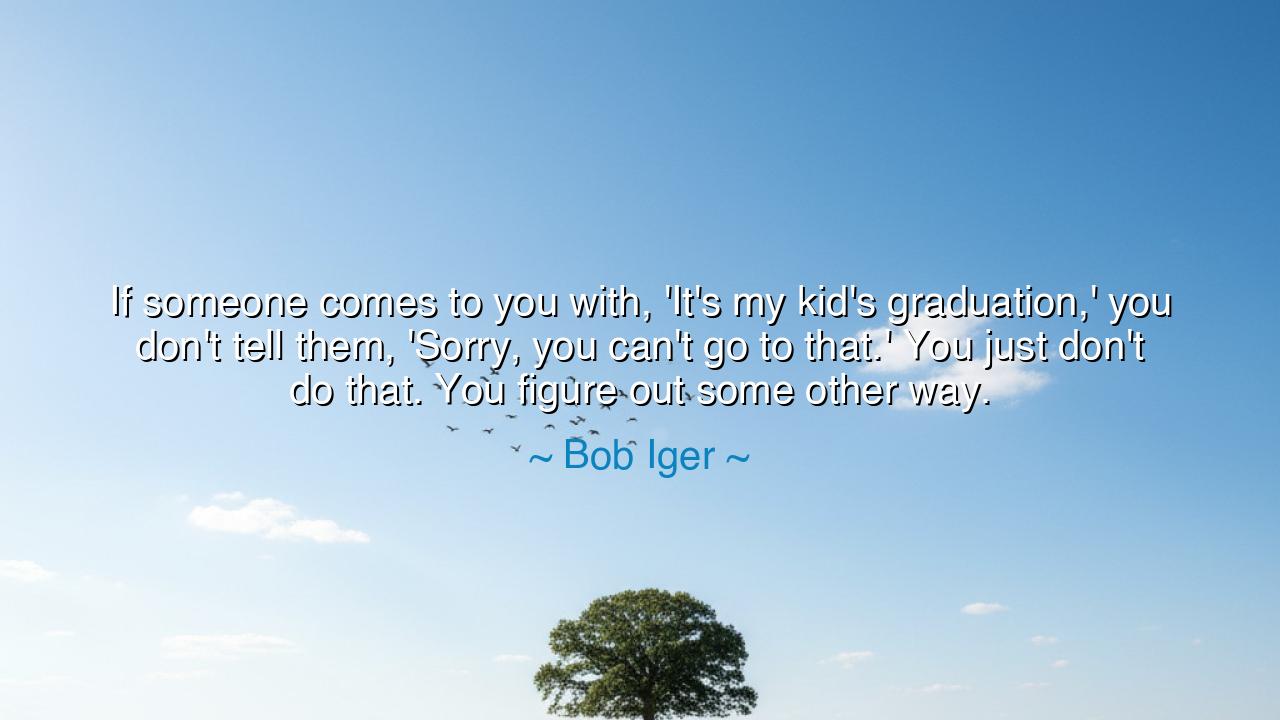
If someone comes to you with, 'It's my kid's graduation,' you
If someone comes to you with, 'It's my kid's graduation,' you don't tell them, 'Sorry, you can't go to that.' You just don't do that. You figure out some other way.






The words of Bob Iger, “If someone comes to you with, ‘It’s my kid’s graduation,’ you don’t tell them, ‘Sorry, you can’t go to that.’ You just don’t do that. You figure out some other way,” are simple in sound, yet profound in truth. They speak not only of leadership, but of humanity — of the sacred duty to honor what is human before what is professional. In these few words lies an ancient law of wisdom: that no empire, no company, no ambition can stand strong unless it remembers the beating hearts of those who build it. The great leader is not the one who commands obedience, but the one who understands compassion.
In the old days, the masters of men were measured by their armies or their palaces. But the wisest among them — the Solomons, the Ashokas, the Abrahams Lincolns of the world — knew that the truest test of power is not how one rules the many, but how one cares for the few. Bob Iger, in his quiet command, reminds us of this timeless truth: that leadership is not dominance, but empathy in action. When a man or woman places family above duty for a sacred moment — such as a child’s graduation — it is not weakness. It is the remembrance of what makes all labor meaningful.
To deny such a moment is to wound the spirit that works for you. To allow it is to strengthen the bond of trust that no paycheck can buy. The ancients called this the Law of Balance — that every person must have time for the hearth as well as the field. The worker who is denied the joy of witnessing his child’s triumph will return with a heavy heart, and his labor, though diligent, will lose its soul. But the one who is honored and understood will return with renewed purpose, his spirit aflame with gratitude. Thus, the wise leader gives not permission but blessing — and in return receives loyalty that endures beyond any command.
Think of the story of Marcus Aurelius, emperor of Rome, philosopher of restraint and mercy. Amid wars and political storms, he wrote of the need to see others as “fellow souls,” each carrying their own burdens and joys. He would often dismiss a soldier or a servant to tend to a family matter, saying that “the empire will stand another hour without him, but his heart may not.” In this spirit, Bob Iger’s words are a modern echo of a timeless creed — that the humanity of the leader is the strength of the realm.
There is a power in knowing when to say yes to the human moment. It requires humility, for the ego loves control, and control often disguises itself as efficiency. But true efficiency, true greatness, lies in creating a world where the heart and the task coexist. When a leader says, “Go — be with your child,” they are not losing an employee; they are gaining an ally. For the act of figuring out another way is not merely logistical — it is spiritual. It means saying, “Your life matters beyond what you do for me.” And such words, though unspoken, resonate forever.
The modern world, with its speed and systems, often forgets this wisdom. We glorify tireless effort and call it virtue. But the ancients would remind us: a machine may run without rest, but a soul cannot. The shepherd who drives his flock without pause will find only exhaustion and rebellion; the shepherd who leads with care will find the wool soft and the loyalty firm. The same holds true in the offices, the studios, and the boardrooms of our time. The soul of a company is not in its profit, but in its people — in their moments of joy, pride, and love.
And so, the teaching is clear: honor life as much as labor. When someone comes to you, asking time for what is sacred, listen not with the ears of authority but with the heart of understanding. Remember that every worker is also a parent, a friend, a dreamer — and that their world extends far beyond the walls of work. The wise leader finds solutions, not excuses; paths, not prohibitions.
Let this be your practice, O listener: when the moment arises and you are faced with the choice between the rule and the heart, choose the heart, and make the rule serve it. For compassion is not weakness — it is wisdom. And in time, you will see that what you give in understanding returns a hundredfold in strength, loyalty, and harmony. To lead with empathy is to lead with eternity in mind — for only kindness, in the end, outlasts all orders.






AAdministratorAdministrator
Welcome, honored guests. Please leave a comment, we will respond soon